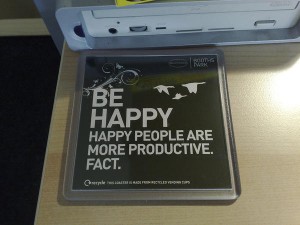 First of all, it is your responsibility to be happy at work. Let’s be clear, your boss does not care that you are happy if you are productive. Your office mates like you more when you are happy, but nowhere in their job descriptions does it require them to make you happy.
First of all, it is your responsibility to be happy at work. Let’s be clear, your boss does not care that you are happy if you are productive. Your office mates like you more when you are happy, but nowhere in their job descriptions does it require them to make you happy.
Alas, this is easier said than done. The odds are against happiness at work.
On the other hand, rudeness at work is easy, rampant, and on the rise. In 2011, half of the workers surveyed by Thunderbird School of Global Management said they were treated rudely at least once a week — up from a quarter in 1998. Yikes. And there is a tangible cost of this bad behavior.
Through a poll of 800 managers and employees in 17 industries, a recent study shows just how people’s reactions play out. Among workers who’ve been on the receiving end of incivility:
- 48% intentionally decreased their work effort
- 47% intentionally decreased the time spent at work
- 38% intentionally decreased the quality of their work
- 80% lost work time worrying about the incident
- 63% lost work time avoiding the offender
- 66% said that their performance declined
- 78% said that their commitment to the organization declined
- 12% said that they left their job because of the uncivil treatment
- 25% admitted to taking their frustration out on customers
Here are some examples of what can happen as a result of incivility:
- Creativity suffers — participants who were treated rudely by other subjects were 30% less creative than others in the study.
- Performance and team spirit deteriorate — Simply witnessing incivility has negative consequences: witnesses to incivility were less likely than others to help out, even when the person they’d be helping had no apparent connection to the uncivil person.
- Customers turn away — Disrespectful behavior by employees makes people uncomfortable, and they’re quick to walk out without making a purchase.
- Managing incidents is expensive — Managers and executives spend 13% percent of their work time — the equivalent of seven weeks a year — mending employee relationships and otherwise dealing with the aftermath of incivility.
Double yikes! Well here are a couple of ideas to help bolster civility, positive moods and being happy at work.
Start off in a good mood. “Generally, a positive mood has been found to enhance creative problem solving and flexible yet careful thinking,” says Ruby Nadler, a graduate student at the University of Western Ontario. She and colleagues Rahel Rabi and John Paul Minda carried out a new study published in Psychological Science.
Happy volunteers were better at learning a rule to classify the patterns than sad or neutral volunteers. “If you have a project where you want to think innovatively, or you have a problem to carefully consider, being in a positive mood can help you to do that,” Nadler says. And music is an easy way to get into a good mood. Everyone has a different type of music that works for them — don’t feel like you have to switch to Mozart, she says.
Music and mood are closely interrelated — listening to a sad or happy song on the radio can make you feel more sad or happy. However, such mood changes not only affect how you feel, they also change your perception. For example, people will recognize happy faces if they are feeling happy themselves.
 Jolij and Meurs had test subjects perform a task in which they had to identify happy and sad smileys while listening to happy or sad music. Music turned out to have a great influence on what the subjects saw: smileys that matched the music were identified much more accurately. And, even when no smiley at all was shown, the subjects often thought they recognized a happy smiley when listening to happy music and a sad one when listening to sad music.
Jolij and Meurs had test subjects perform a task in which they had to identify happy and sad smileys while listening to happy or sad music. Music turned out to have a great influence on what the subjects saw: smileys that matched the music were identified much more accurately. And, even when no smiley at all was shown, the subjects often thought they recognized a happy smiley when listening to happy music and a sad one when listening to sad music.
“Our work provides support for what many people already do — listen to music to improve their moods,” said lead author Yuna Ferguson, who performed a study while she was an MU doctoral student in psychological science. “Although pursuing personal happiness may be thought of as a self-centered venture, research suggests that happiness relates to a higher probability of socially beneficial behavior, better physical health, higher income and greater relationship satisfaction.” Yes, she said being happy at work and listening to happy music will result in higher incomes. Repeat: Higher incomes.
In two studies by Ferguson, participants successfully improved their moods in the short term and boosted their overall happiness over a two week period. During the first study, participants improved their mood after being instructed to attempt to do so, but only if they listened to the upbeat music of Copland, as opposed to the more somber Stravinsky. Other participants, who simply listened to the music without attempting to change their mood, also didn’t report a change in happiness. In the second study, participants reported higher levels of happiness after two weeks of lab sessions in which they listened to positive music while trying to feel happier, compared to control participants who only listened to music.
So if you seek happiness in life and at work, use music to positively impact your mood, be more creative and a better problem solver, improve behavior and increase civility. Yu are not limited to the happier tones of Aaron Copeland. Listen to whatever makes you tap your toes. I am experimenting with Salsa music right now. Right, the music was too loud and I forgot, use music to increase your income.
Journal References:
- Jacob Jolij, Maaike Meurs. Music Alters Visual Perception. PLoS ONE, 2011; 6 (4): e18861 DOI: 10.1371/journal.pone.0018861
- Ruby T. Nadler, Rahel Rabi, John Paul Minda. Better Mood and Better Performance: Learning Rule Described Categories Is Enhanced by Positive Mood. Psychological Science, 2010; 21: 1770-1776 DOI: 10.1177/0956797610387441
- Christine Porath and Christine Pearson. The Price of Incivility. Harvard Business Review, 2013
- Yuna L. Ferguson, Kennon M. Sheldon. Trying to be happier really can work: Two experimental studies. The Journal of Positive Psychology, 2013; 8 (1): 23 DOI: 10.1080/17439760.2012.747000
(Photo credit: © Syda Productions / Fotolia)
Photo credit: ohskylab / Foter.com / CC BY-NC-SA



Please note: I reserve the right to delete comments that are offensive or off-topic.